

These publications demonstrate the authorship of the Pentateuch, the value of the Ten Commandments, and acknowledgements from various scholars, philosophers and statesmen on the impact of Mosaic law in civilization. Some essays compare the legal system of Moses to those of other ancient systems.
"The most important business in this Nation--or any other nation, for that matter--is raising and training children. If those children have the proper environment at home, and educationally, very, very few of them ever turn out wrong. I don't think we put enough stress on the necessity of implanting in the child's mind the moral code under which we live.
"The fundamental basis of this Nation's law was given to Moses on the Mount. The fundamental basis of our Bill of Rights comes from the teachings which we get from Exodus and St. Matthew, from Isaiah and St. Paul. I don't think we emphasize that enough these days.
"If we don't have the proper fundamental moral background, we will finally wind up with a totalitarian government which does not believe in rights for anybody except the state."
--President Harry S. Truman, Address Before the Attorney General's Conference on Law Enforcement Problems. February 15th, 1950.
We invite researchers to visit our sister webpages, America's Christian Heritage and Classic Legal Apologetics.
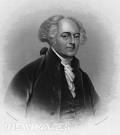
American President. Read more about President Adams here. Disclaimer: Adams shifted from Congregationalist to Unitarian.
February 22. Sunday. "Suppose a nation in some distant region should take the Bible for their only law-book, and every member should regulate his conduct by the precepts there exhibited! Every member would be obliged, in conscience, to temperance and frugality and industry; to justice and kindness and charity towards his fellow men; and to piety, love, and reverence, towards Almighty God. In this commonwealth, no man would impair his health by gluttony, drunkenness, or lust; no man would sacrifice his most precious time to cards or any other trifling and mean amusement; no man would steal, or lie, or in any way defraud his neighbor, but would live in peace and good will with all men; no man would blaspheme his Maker or profane his worship; but a rational and manly, a sincere and unaffected piety and devotion would reign in all heats. What a Utopia; what a Paradise would this region be!"
"The Christian religion is, above all the religions that ever prevailed or existed in ancient or modern times, the religion of wisdom, virtue, equity, and humanity, let the blackguard Paine say what he will; it is resignation to God, it is goodness itself to man."
... "One great advantage of the Christian religion is, that it brings the great principle of the law of nature and nations, -- Love your neighbor as yourself, and do to others as you would that others should do to you, -- to the knowledge, belief, and veneration of the whole people. Children, servants, women, and men, are all professors in the science of public and private morality. No other institution of education, no kind of political discipline, could diffuse this kind of necessary information, so universally among all ranks and descriptions of citizens. The duties and rights of the man and the citizen are thus taught from early infancy to every creature. The sanctions of a future life are thus added to the observance of civil and political, as well as domestic and private duties. Prudence, justice, temperance, and fortitude, are thus taught to be the means and conditions of future as well as present happiness."
"The moment the idea is admitted into society, that property is not as sacred as the laws of God, and that there is not a force of law and public justice to protect it, anarchy and tyranny commence. If 'Thou shalt not covet,' and 'Thou shalt not steal,' were not commandments of Heaven, they must be made inviolable precepts in every society, before it can be civilized or made free."
"While our country remains untainted with the principles and manners which are now producing desolation in so many parts of the world; while she continues sincere, and incapable of insidious and impious policy, we shall have the strongest reason to rejoice in the local destination assigned us by Providence. But should the people of America once become capable of that deep simulation towards one another, and towards foreign nations, which assumes the language of justice and moderation while it is practising iniquity and extravagance, and displays in the most captivating manner the charming pictures of candor, frankness, and sincerity, while it is rioting in rapine and insolence, this country will be the most miserable habitation in the world; because we have no government armed with power capable of contending with human passions unbridled by morality and religion. Avarice, ambition, revenge, or gallantry, would break the strongest cords of our Constitution as a whale goes through a net. Our Constitution was made only for a moral and religious people. It is wholly inadequate to the government of any other."
" ... I will insist that the Hebrews have done more to civilize men than any other nation. If I were an atheist, and believed in blind eternal fate, I should still believe that fate had ordained the Jews to be the most essential instrument for civilizing the nations. If I were an atheist of the other sect, who believe or pretend to believe that all is ordered by chance, I should believe that chance had ordered the Jews to preserve and propagate to all mankind the doctrine of a supreme, intelligent, wise, almighty sovereign of the universe, which I believe to be the great essential principle of all morality, and consequently of all civilization."--pp. 608-610.
" ... Conclude not from all this that I have renounced the Christian religion, or that I agree with Dupuis in all his sentiments. Far from it. I see in every page something to recommend Christianity in its purity, and something to discredit its corruptions. If I had strength, I would give you my opinion of it in a fable of the bees. The Ten Commandments and the Sermon on the Mount contain my religion."--p. 228.
"The general principles on which the fathers achieved independence, were the only principles in which that beautiful assembly of young men could unite, and these principles only could be intended by them in their address, or by me in my answer. And what were these general principles? I answer, the general principles of Christianity, in which all those sects were united, and the general principles of English and American liberty, in which all those young men united, and which had united all parties in America, in majorities sufficient to assert and maintain her independence. Now I will avow, that I then believed and now believe that those general principles of Christianity are as eternal and immutable as the existence and attributes of God; and that those principles of liberty are as unalterable as human nature and our terrestrial, mundane system. I could, therefore safely say, consistently with all my then and present information, that I believed they would never make discoveries in contradiction to these general principles."
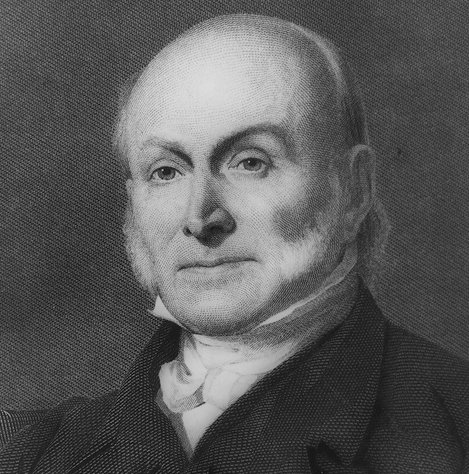
Sixth American President. Note: Bill Haymin, "Letters of John Quincy Adams to His Son." American Chronicle, January 12, 2008. "In his later years Adams was associated with the Unitarian Church, yet, Unitarianism at this time was much different than it is today. For one, it was firmly rooted in the Bible. Adams believed in the divine nature of the Holy Scriptures and the assertion that Christ was God. Unitarians were described in the Theological Dictionary of 1823 in these words:
"In common with other Christians, they confess that He [Jesus] is the Christ, the Son of the Living God; and in one word, they believe all that the writers of the New Testament, particularly the four Evangelists, have stated concerning him." Entry by Rev. Charles Buck, A Theological Dictionary Containing Definitions of All Religious Terms. Philadelphia: Edwin T. Scott, 1823, p. 582. See here for more about Adams's faith.
Read more about President Adams here, here and here.
... "But, it is the God of the Hebrews alone, who is announced to us as the Creator of the world. The ideas of God entertained by all the most illustrious and most ingenious nations of antiquity were weak and absurd. The Persians worshipped the sun; the Egyptians believed in an innumerable multitude of gods, and worshipped not only oxen, crocodiles, dogs, and cats, but even garlics and onions. The Greeks invented a poetical religion, and adored men and women, virtues and vices, air, water, and fire, and everything that a vivid imagination could personify. Almost all the Greek philosophers reasoned and meditated upon the nature of the gods; but scarcely any of them reflected enough even to imagine that there was but one God, and not one of them ever conceived of him as the Creator of the world. Cicero has collected together all their opinions upon the nature of the gods, and pronounced them more like the dreams of madmen than the sober judgment of wise men. In the first book of Ovid's Metamorphoses, there is an account of the change of chaos in the world. Before the sea, and the earth, and the sky that surrounds all things (says Ovid), there was a thing called chaos, and some of the gods (he does not know which), separated from each other the elements of this chaos, and turned them into the world; thus far and no farther could human reason extend. But the first words of the Bible are, 'In the beginning God created the heavens and the earth.' The blessed and sublime idea of God, as the creator of the universe, the source of all human happiness for which all the sages and philosophers of Greece and Rome groped in darkness and never found, is recalled in the first verse of the book of Genesis. I call it the source of all human virtue and happiness; because when we have attained the conception of a Being, who by the mere act of his will, created the world, it would follow as an irresistible consequence--even if we were not told that the same Being must also be the governor of his own creation--that man, with all other things, was also created by him, and must hold his felicity and virtue on the condition of obedience to his will."
..."The law given from Sinai was a civil and municipal as well as a moral and religious code; it contained many statutes adapted to that time only, and to the particular circumstances of the nation to whom it was given; they could of course be binding upon them, and only upon them, until abrogated by the same authority which enacted them, as they afterward were by the Christian dispensation: but many others were of universal application -- laws essential to the existence of men in society, and most of which have been enacted by every nation which ever professed any code of laws."
... "But if you would remark the distinguishing characteristics between true and false religion, compare the manner in which the ten commandments were proclaimed by the voice of the Almighty God, from Mount Sinai, with thunder, and lightning, and earthquake, by the sound of the trumpet, and in the hearing of six thousand souls, with the studied secresy, and mystery, and mummery, with which the Delphic and other oracles of the Grecian gods were delivered. The miraculous interpositions of Divine power recorded in every part of the Bible, are invariably marked with grandeur and sublimity worthy of the Creator of the world, and before which the gods of Homer, not excepting his Jupiter, dwindle into the most contemptible pigmies; but on no occasion was the manifestation of the Deity so solemn, so awful, so calculated to make indelible impressions upon the imaginations and souls of the mortals to whom he revealed himself, as when he appeared in the character of their Lawgiver. The law thus dispensed was, however, imperfect; it was destined to be partly suspended and improved into absolute perfection many ages afterward by the appearance of Jesus Christ upon earth. But to judge of its excellence as a system of laws, it must be compared with human codes which existed or were promulgated at nearly the same age of the world in other nations. Remember, that the law was given 1,490 years before Christ was born, at the time the Assyrian and Egyptian monarchies existed: but of their government and laws we know scarcely anything save what is collected from the Bible. Of the Phrygian, Lydian, and Trojan states, at the same period, little more is known. The president Gorget, in a very elaborate and ingenious work on the origin of letters, arts, and sciences, among the ancient nations, says, that 'the maxims, the civil and political laws of these people, are absolutely unknown; that not even an idea of them can be formed, with the single exception of the Lyclians, of whom Herodotus asserts, that their laws were the same as the Greeks.' -- The same author contrasts the total darkness and oblivion into which all the institutions of these mighty empires have fallen, with the fulness and clearness and admirable composition of the Hebrew code, which has not only descended to us entire, but still continues the national code of the Jews (scattered as they are over the whole face of the earth), and enters so largely into the legislation of almost every civilized nation upon the globe. He observes that 'these laws have been prescribed by God himself: the merely human laws of other contemporary nations can not bear any comparison with them.'"
... "But my motive in forming the comparison, is to present to your reflections as a proof--and to my mind a very strong proof-- of the reality of their divine origin: for how is it that the whole system of government, and administration, the municipal, political, ecclesiastical, military, and moral laws and institutions, which bound in society the numberless myriads of human beings who formed for many successive ages the stupendous monarchies of Africa and Asia, should have perished entirely and been obliterated from the memory of mankind, while the laws of a paltry tribe of shepherds, characterized by Tacitus, and the sneeringinfidelity of Gibbon, as 'the most despised portion of their slaves,' should not only have survived the wreck of those empires, but remain to this day rules of faith and practice to every enlightened nation of the world, and perishable only with it? The reason is obvious: it is their intrinsic excellence which has preserved them from the destruction which befalls all the works of mortal man. The precepts of the decalogue alone (says Gorget), disclose more sublime truths, more maxims essentially suited to the happiness of man, than all the writings of profane antiquity put together can furnish. The more you meditate on the laws of Moses, the more striking and brighter does their wisdom appear. It would be a laborious but not an unprofitable investigation, to reduce into a regular classification, like that of the institutes of Justinian or the Commentaries of Blackstone, the whole code of Moses, which embraces not only all the ordinary subjects of legislation together with the principles of religion and morality, but laws of ecclesiastical directions concerning the minutest actions and dress of individuals. This, however, would lead me too far from my present purpose, which is merely to consider the Bible as a system of morality; I shall therefore notice those parts of the law which may be referred particularly to that class, and at present must confine myself to a few remarks upon the decalogue itself, which, having been spoken by the voice, and twice written upon the stone tables by the finger of God, may be considered as the foundation of the whole system--of the ten commandments, emphatically so called, for the extraordinary and miraculous distinction by which they were promulgated."
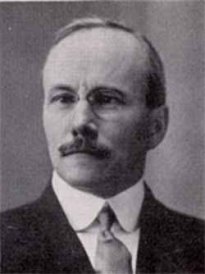
Presbyterian theologian. Read more about Allis here and here.
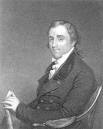
U. S. Representative. Read more about Ames here, here and here.

U.S. Representative from New York. Read about Barnard here.

Founder of Wallbuilders. Read about Barton here.
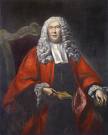
English Jurist. Knighted in 1770. Read more about Blackstone here and here and here.
Considering the Creator only as a being of infinite power, he was able unquestionably to have prescribed whatever laws he pleased to his creature, man, however unjust or severe. But as he is also a being of infinite wisdom, he has laid down only such laws as were founded in those relations of justice, that existed in the nature of things antecedent to any positive precept. These are the eternal, immutable laws of good and evil, to which the Creator himself in all his dispensations conforms; and which he has enabled human reason to discover, so far as they are necessary for the conduct of human actions. Such, among others, are these principles: that we should live honestly, should hurt nobody, and should render to every one his due; to which three general precepts Justinian has reduced the whole doctrine of law.
But if the discovery of these first principles of the law of nature depended only upon the due exertion of right reason, and could not otherwise be obtained than by a chain of metaphysical disquisitions, mankind would have wanted some inducement to have quickened their inquiries, and the greater part of the world would have rested content in metal indolence, and ignorance, its inseparable companion. As therefore the Creator is a being, not only of infinite power and wisdom, but also of infinite goodness, he has been pleased so to contrive the constitution and frame of humanity, that we should want no other prompter to inquire after and pursue the rule of right, but only our own self-love, that universal principle of action. For he has so intimately connected, so inseparably interwoven the laws of eternal justice with the happiness of each individual, that the latter cannot be attained but by observing the former; and if the former be punctually obeyed, it cannot but induce the latter. In consequence of which mutual connection of justice and human felicity, he has not perplexed the law of nature with a multitude of abstracted rules and preempts, referring merely to the fitness or unfitness of things, as some have vainly surmised; but has graciously reduced the rule of obedience to this one paternal precept, " that man should pursue his own true and substantial happiness." This is the foundation of what we call ethics, or natural law. For the several articles into which it is branched in our systems amount to no more than demonstrating, that this or that action tends to man's real happiness, and therefore very justly concluding that the performance of it is a part of the law of nature; or, on the other hand, that this or that action is destructive of man's real happiness, and therefore that the law of nature forbids it.
This law of nature, being coeval with mankind, and dictated by God himself, is of course superior in obligation to any other. It is binding over all the globe, in all countries, and at all times: no human laws are of any validity, if contrary to this; and such of them as are valid derive all their force and all their authority, mediately or immediately, from this original.
But in order to apply this to the particular exigencies of each individual, it is still necessary to have recourse to reason; whose office it is to discover, as was before observed, what the law of nature directs in every circumstance of life: by considering what method will tend the most effectually to our own substantial happiness. And if our reason were always, as in our first ancestor before his transgression, clear and perfect, unruffled by passions, unclouded by prejudice, unimpaired by disease or intemperance, the task would be pleasant and easy; we should need no other guide but this.-- But every man now finds the contrary in his own experience; that his reason is corrupt, and his understanding full of ignorance and error.
This has given manifold occasion for the benign interposition of Divine Providence; which, in compassion to the frailty, the imperfection, and the blindness of human reason, hath been pleased at sundry times and in divers manners, to discover and enforce its laws by an immediate and direct revelation. The doctrines thus delivered we call the revealed or divine law, and they are to be found only in the Holy Scriptures. These precepts, when revealed, are found upon comparison, to be really a part of the original law of nature, as they tend in all their consequences to man's felicity. But we are not from thence to conclude that the knowledge of these truths was attainable by reason, in its present corrupted state; since we find that, until they were revealed, they were hid from the wisdom of ages. As then the moral precepts of this law are indeed of the same original with those of the law of nature, so their intrinsic obligation is of equal strength and perpetuity. Yet undoubtedly the revealed law is of infinitely more authenticity than that moral system which is framed by ethical writers, and denominated the natural law. Because one is the law of nature expressly declared so to be by God himself: the other is only what, by the assistance of human reason, we imagine to be that law. If we could be as certain of the latter as we are of the former, both would have an equal authority: but, till then, they can never be put in any competition together.
Upon these two foundations, the law of nature and the law of revelation, depend all human laws; that is to say, no human laws should be suffered to contradict these. There are, it is true, a great number of indifferent points, in which both the divine law and the natural leave a man at his own liberty; but which are found necessary for tire benefit of society to be restrained within certain limits. And herein it is that human laws have their greatest force and efficacy: for with regard to such points as are not indifferent, human laws are only declaratory of, and act in subordination to, the former.
"Divine Providence, which, in compassion to the frailty, the imperfection, and the blindness of human reason, hath been pleased, in sundry times and diverse manners, to discover and enforce its laws by an immediate and direct revelation. The doctrines thus delivered we call the revealed or divine law, and they are to be found only in the Holy Scriptures"
"The Commentaries of Blackstone continue to be the text book of the student and of the man of genereal reading, notwithstanding the alterations in the law since the time of their author. The great principles which they unfold remain the same, and are explained in so simple and clear a style, that, however much the details of the law may be changed, they will always be read with interest. It is no small commendation of Blackstone, that many of the modern improvements adopted in England and in the United States were suggested by him: and that the arrangement which he used in treating the different subjects, has been followed in a great degree by the Revisers of the Statutes of New-York.
Baptist preacher. Read about Booth here.
Chaplain in Hartford, Connecticut.
Legal author.
* John Henry Wigmore, A Panorama of the World's Legal Systems, 3 vols. (Saint Paul, MN: West Publishing Company, 1928), 1:105.
The Scriptures doubtless have been a potent influence upon American Law. In the early colonial period, the Bible seems to haven commonly regarded among the people as law. Several of the colonies formally adopted provisions of Mosaic law.* For example, Plymouth Colony in 1636 adopted a 'small body of Lawes' largelybased upon the laws of Israel. And New Haven Colony in 1639 resolved that 'the word of God shall be the only rule to be attended to in ordering the affairs of government in this plantation,'** and in 1655 adopted a code in which 47 out of 79 topical statutes were based on the Bible.***
* William Galbraith Miller, The Data of Jurisprudence (Edinburgh and London: William Green and Sons, 1903), 416.
** The Preamble to The Fundamental Orders (1639) reads: "For as much as it hath pleased Almighty God by the wise disposition of his divine providence . . . [A]
people are gathered together the word of God requires that to maintain the peace and union of such a people there should be an orderly and decent Government established according to God, to order and dispose of the affairs of the people at all seasons as occasion shall require; do therefore associate and conjoin ourselves to be as one Public State or Commonwealth; and do for ourselves and our successors and such as shall be adjoined to us at any time hereafter, enter into Combination and Confederation together, to maintain and preserve the liberty and purity of
the Gospel of our Lord Jesus which we now profess, as also, the discipline of the Churches, which according to the truth of the said Gospel is now practiced amongst us; as also in our civil affairs to be guided and governed according to such Laws,
Rules, Orders and Decrees as shall be made, ordered, and decreed as followeth:"
*** Clark, Biblical Law, 44.
Gary DeMar: I was first introduced to Clark's Biblical Law when I saw it referenced in Rousas J. Rushdoony's The Institutes of Biblical Law. Clark's subtitle offers the best summary of his work that I can offer: Being a Text of the Statutes, Ordinances, and Judgments Established in the Holy Bible--with Many Allusions to Secular Laws Ancient, Medieval and Modern--Documented to the Scriptures, Judicial Decisions and Legal Literature. Biblical Law is laid out as a legal text. It consists of seven parts and 65 chapters and includes material on General Principles, Political Law, Civil Law, Economics and Welfare, General Laws, Penal Law, Crimes and Punishment, and Procedure and Administration of Law. Biblical Law is one of the most comprehensive studies of the application of the Bible to contemporary life that one will ever come across. For Clark, law means a rule or a body of rules for the government of human life, prescribing rights and duties and regulating conduct. As you can see, Clark's definition of law is comprehensive. Law is not just for the individual; it's for all of life, including the civil sphere of life. Clark's extensive footnotes--thousands of them referencing the Bible and court cases--show how often the Bible has been used in contemporary lawmaking. Biblical Law is a true compendium of the Bibles use of law touching on everything--from religious freedom, sales, exchanges, leases, labor and employment to health, healing, physicians, and everything in between.

English jurist. Read about Coke here.
The law of nature is that which God at the time of creation of the nature of man infused into his heart, for his preservation and direction; and this is lex aeterna, the moral law, called also the law of nature. ...
And by this law, written with the finger of God in the heart of man, were the people of God a long time governed, before the law was written by Moses, who was the first reporter or writer of law in the world. The Apostle in the Second Chapter to the Romans saith, Cum enim gentes qu? legem non habent naturaliter ea qu? legissuntfactunt. And this is within the command of that moral law, honora patrem, which doubtless doth extend to him that is pater patriae. And that Apostle saith, Omnis anima poteslalibus sublimioribus subdita sit. And these be the words of the Great Divine, Hoc Drus in Sacra Scripluris jubet, hoc lex naturae dictari, ut quilibet subditm obediat superio, ... This law of nature, which indeed is the eternal law of the Creator, infused into the heart of the creature at the time of his creation, was two thousand years before any laws written, and before any judicial or municipal laws.
Cited in Calvin's Case, 77 Eng. Rep. 377, 392 (1609).
George Goodwin (1757-1844), publisher. Published in Hartford, Connecticut, Printed by Hudson & Goodwin. Vol. 27, no. 1365 (Mar. 21, 1791)-v. 109, no. 542,085 (Jan. 3, 1874) ; v. 109, no. 2 (Jan. 10, 1874)-v. 149, no. 86 (Oct. 29, 1914).; v. ; 45-51 cm.
Also "Extract, From 'A Series of Letters on the Establishment of the Worship of the Deity as Essential to National Happiness, Published in 1789" republished from the Salem Gazette, and "At a Meeting of the Baptist Society in Hartford, and Others Friendly to Civil and Religious Freedom, Holden by Adjournment, 4th August, 1818," by Benjamin Fowler, Moderator and Jeremiah Brown, Clerk; and "To the General Assembly of the State of Connecticut, Now in Session" by Oliver Ellsworth.
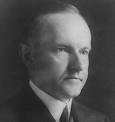
30th President of the United States. Read more about Coolidge here and here.
Educator. Read about Curtiss here.

French political thinker. Read more about de Tocqueville here and here.
Zealous Christians may be found among us whose minds are nurtured in the love and knowledge of a future life, and who readily espouse the cause of human liberty as the source of all moral greatness. Christianity, which has declared that all men are equal in the sight of God, will not refuse to acknowledge that all citizens are equal in the eye of the law. But, by a singular concourse of events, religion is entangled in those institutions which democracy assails, and it is not unfrequently brought to reject the equality it loves, and to curse that cause of liberty as a foe which it might hallow by its alliance.
By the side of these religious men I discern others whose looks are turned to the earth more than to Heaven; they are the partisans of liberty, not only as the source of the noblest virtues, but more especially as the root of all solid advantages; and they sincerely desire to extend its sway, and to impart its blessings to mankind. It is natural that they should hasten to invoke the assistance of religion, for they must know that liberty can not be established without morality, nor morality without faith; but they have seen religion in the ranks of their adversaries, and they inquire no further; some of them attack it openly, and the remainder are afraid to defend it. Volume 1, xxix, xl.
It must never be forgotten that religion gave birth to Anglo-American society. In the United States, religion is therefore mingled with all the habits of the nation and all the feelings of patriotism, whence it derives a peculiar force. To this reason another of no less power may be added: in America, religion has, as it were, laid down its own limits. Religious institutions have remained wholly distinct from political institutions, so that former laws have been easily changed whilst former belief has remained unshaken.
Christianity has therefore retained a strong hold on the public mind in America; and I would more particularly remark, that its sway is not only that of a philosophical doctrine which has been adopted upon inquiry, but of a religion which is believed without discussion. In the United States, Christian sects are infinitely diversified and perpetually modified; but Christianity itself is all established and irresistible fact, which no one undertakes either to attack or to defend. The Americans, having admitted the principnl doctrines of the Christian religion without inquiry, are obliged to accept in like manner a great number of moral truths originating in it and connected with it. Hence the activity of individual analysis is restrained within narrow limits, and many of the most important of human opinions are removed from its influence.--pp. 5-6.
Religion perceives that civil liberty affords a noble exercise to the faculties of man, and that the political world is a field prepared by the Creator for the efforts of the intelligence. ' Contented with the freedom and the power which it enjoys in its own sphere, and with the place which it occupies, the empire of religion is never more surely established than when it reigns in the hearts of men unsupported by aught beside its native strength. Religion is no less the companion of liberty in all its battles and its triumphs; the cradle of its infancy, and the divine source of its claims. The safeguard of morality is religion, and morality is the best security of law and the surest pledge of freedom.-p. 43

34th President of the United States. Read more about Eisenhower here and here and at The Eisenhower Presidential Library and Museum Homepage.
The blessings of life and the freedoms all of us enjoy in this land today are based in no small measure on the Ten Commandments which have been handed down to us by the religious teachers of the Jewish faith. These Commandments of God provide endless opportunities for fruitful service, and they are a stronghold of moral purpose for men everywhere.
American historian. Read about Federer at his website.
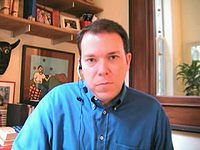
Writer. Read about Feiler at his website.
Author from Birmingham, Alabama. Increasing Learning, a research ministry which specializes in the public defense of the Bible and its application to American society.
Congregational pastor.
The occasion, my brethren and friends, on which we have assembled, is a joyful and solemn occasion. It is no other than to commemorate the birth-day of our National Independence,--to retrace the steps by which we arrived at that event,--to review the scenes, through which we passed--to recall to mind the labors, and dangers, and sufferings by which it was obtained--and what ought to be our principal concern, to make our devout acknowledgments to that great and good BEING, by whose favor and blessing it was accomplished. And what can be more appropriate, as a theme of discourse, than the words which I have just read? In these words, MOSES, by divine direction, required of the children of Israel, annually to commemorate the day of their deliverance from the Egyptain bondage, which may be considered the day on which their National Independence commenced. They had been a nation perculiarly favored of heaven. From a single family, or rather from a single pair, they had been increased to a numerous and powerful nation. They had passed through a variety of scenes, in all which they experienced, in a peculiar degree, the favor and protection of GOD. These signal mercies demanded of them special acknowledgments. They were required, therefore, to do and observe a number of things, as memorials of particular favors which they had received. But as their deliverance from the bondage of Egypt was an event, in which the divine interposition was remarkably visible, and laid the foundation of their existence, as an independent nation, they were required to observe the day, on which it took place, as a standing memorial of the divine goodness. And have not we, also, my hearers, experienced, as a nation, signal interpositions of divine Providence, in our favor. And ought not we to observe, as the Jews were required to do, the day on which commenced our national existence, as a memorial of the divine goodness? We have not, indeed, as they had, an express divine command to do this. But when we consider the similarity between the favors, which the Jews, as a nation, received at the hand of GOD, and those which have been conferred on us, does there not appear to be an evident propriety in it?
What I propose, therefore, on the present occasion, is, in the First place, to endeavor, more at large, to shew the propriety of commemorating the day of our National Independence, from a comparison of the national favors, which we have received, at the hand of GOD, with those which were conferred on the Jews;--and Secondly, to point out some of the ends for which it ought to be observed.

A Founding Father of the United States of America. Author, printer, satirist, political theorist, politician, scientist, inventor, civic activist, statesman, and diplomat. While he is considered to be a universalist, we include him here because he did promote Christian values. Read more about Franklin here, here, here, and in The Autobiography of Benjamin Franklin.
To conclude, I beg I may not be understood to infer, that our general Convention was divinely inspired when it form'd the new federal Constitution, merely because that Constitution has been unreasonably and vehemently opposed; yet I must own I have so much Faith in the general Government of the World by PROVIDENCE, that I can hardly conceive a Transaction of such momentous Importance to the Welfare of Millions now existing, and to exist in the Posterity of a great Nation, should be suffered to pass without being in some degree influenc'd, guided and governed by that omnipotent, omnipresent and beneficent Ruler, in whom all inferior Spirits live and move and have their Being.
French lawyer. Historian. Read more about Goguet here.
But, if we were to turn our attention to the Hebrew nation, we should find materials in abundance to make us amends for the want of them in the other nations of Asia. From their going out of Egypt the Israelites began to form themselves into a nation, distinct by their laws, and by their customs, from all the rest of the earth; a nation which subsists at this day; and which is still governed by its own particular customs, though dispersed throughout all the countries of the universe.
The political and civil laws of the Hebrews are perfectly known to us; so well indeed, that it is not worthwhile to enumerate them. Besides, we ought not to make any comparison between the form of government established by Moses, and the other species of governments, of which history gives us examples. The Hebrew people had the singular advantage of having God particularly for their monarch, and for their legislator. It was from God himself that this nation had received its laws. In a word, it was the Supreme Being who condescended to prescribe the ceremonies of the worship that he would have paid him by the Israelites. We ought therefore to make no comparison between the laws of this people, laws dictated by wisdom itself, and those that could be observed by other nations. The precepts of the decalogue alone, contain more sublime truths, and maxims more essentially promotive of the good of mankind, than all the profane writings of antiquity could afford. The more we meditate on the laws of Moses, the more we shall perceive their wisdom, and inspiration; that infallible sign of the Divinity which fails all human works, in which, when we examine critically, we always find great defects: besides, the laws of Moses alone have the inestimable advantage, never to have undergone any of the revolutions common to all human laws, which have always demanded frequent amendments; sometimes changes; sometimes additions; sometimes the retrenching of superfluities. There has been nothing changed, nothing added, nothing retrenched from the laws of Moses; a singular example, and so much the more striking, as they have preserved their purity for above 3000 years. If Moses had not been the minister of God, he could not, whatever genius we may suppose him to have had, from himself have drawn laws which received all their perfection the instant of their formation: laws which provided against everything that could happen in the succession of ages, leaving no necessity for change, or even for modification. That is what no legislator has ever done, and what Moses himself could not have done, had he writ simply as a man, and had he not been inspired by the Supreme Being. -- pp. 7-8
English divine. Read more about Goodwin here.
Theological scholar.
By commanding to keep holy the sabbath, as the memorial of the creation, it establishes the necessity of public worship, and of a stated and outward profession of the truths of religion, as well as of the cultivation of suitable feelings: and it enforces this by a motive which is equally applicable to all mankind: and which should have taught the Jew, that he ought to consider all nations as equally creatures of that Jehovah whom he himself adored; equally subject to his government, and if sincerely obedient, entitled to all the privileges his favour could bestow. It is also remarkable, that this commandment, requiring that the rest of the sabbath should include the man-servant, and the maidservant, and the stranger that was within their gates, nay, even their cattle, proved that the Creator of the Universe extended his attention to all his creatures; that the humblest of mankind were the objects of his paternal love; that no accidental differences, which so often create alienation amongst different nations, would alienate any from the divine regard: and that even the brute creation shared the benevolence of their Creator, and ought to be treated by men with gentleness and humanity.
When we proceed to the second table, comprehending more expressly our social duties, we find all the most important principles on which they depend, clearly enforced. The commandment which enjoins, "Honour thy father and mother," sanctions the principles, not merely of filial obedience, but of all those duties which arise from our domestic relations; and, while it requires not so much any one specific act, as the general disposition which should regulate our whole course of conduct in this instance, it impresses the important conviction, that the entire Law proceeds from a Legislator able to search and judge the heart of man.
The subsequent commands coincide with the clear dictates of reason, and prohibit crimes which human laws in general have prohibited as plainly destructive of social happiness. But it was of infinite importance to rest the prohibitions, "Thou shalt not kill--Thou shalt not commit adultery--Thou shalt not steal--Thou shalt not bear false witness," not merely on the deductions of reason, but also on the weight of a divine authority. How often have false ideas of public good in some places, depraved passions in otlvrs, and the delusions of idolatry in still more, established a law of reputation contrary to the dictates of reason, and the real interests of society? In one country we see theft allowed, if perpetrated with address: * in others piracy and rapine honoured, if conducted with intrepidity. Sometimes we perceive adultery permitted, the most unnatural crimes committed without remorse or shame; nay, every species of impurity enjoined and consecrated, as a part of divine worship. In others, we find revenge honoured as spirit--and death inflicted at its impulse, with ferocious triumph. Again, we see every feeling of nature outraged, and parents exposing their helpless children to perish, for deformity of body or weakness of mind, or, what is still more dreadful, from mercenary or political views; and this inhuman practice familiarized by custom, and authorized by law. And to close the horrid catalogue, we see false religions leading their deluded votaries to heap the altars of their idols with human victims: IF the master butchers his slave, the conqueror his captive; nay, dreadful to relate, the parent sacrifices his children, and, while they shriek amidst the tortures of the flames, or in the agonies of death, he drowns their cries by the clangor of cymbals and the yells of fanaticism. Yet these abominations separate or combined, have disgraced ages and nations which we are accustomed to admire and celebrate as civilized and enlightened Babylon and Egypt, Phoenicia and Carthage, Greece and Home. Many of these crimes legislators have enjoined, or philosophers defended. What indeed could be hoped from legislators and philosophers, when we recollect the institutions of Lycurgus, especially as to purity of manners,* and the regulations of Plato on the same subject, in his model of a perfect republic; when we consider the sensuality of the Epicureans, and immodesty of the Cynics; when we find suicide applauded by the Stoics, and the murderous combats of gladiators defended by Cicero, and exhibited by Trajan? Such variation and inconstancy in the rule and practice of moral duty, as established by the feeble or fluctuating authority of human opinion, demonstrates the utility of a clear divine interposition, to impress these important prohibitions; and it is difficult for any sagacity to calculate, how far such an interposition was necessary, and what effect it may have produced by influencing human opinions, and regulating human conduct, when we recollect that the Mosaic code was probably the first written law ever delivered to any nation; and that it must have been generally known in those eastern countries, from which the most ancient and celebrated legislators and sages derived the models of their laws and the principles of their philosophy.
Such is the substance, and such the importance, of the Decalogue.* Shall we then censure and despise the Jewish law, as a system of mere external and useless ceremonies; when it evidently places this great summary of moral duty at the head of all its institutions: and, in the very mode of its promulgation, stamps it with a sacredness and authority suited to its natural pre-eminence? For let it be remembered, that the Decalogue alone was promulgated to the Jews, not by the intermediate ministry of their legislator, but directly to the assembled nation by the voice of God, issuing from the glory on the top of Sinai.
* How strongly is this expressed in the language of some East Indians, to the English! "If you send us a missionary, send us one who has learned your Ten Commandments." Vide Dr Buchanan's Essay on the establishment of an Episcopal Church in India, p. 61, a most interesting and important Work. Vide in the same Work, the cruel and immoral practices sanctioned by the Hindoo superstition, which supply an additional proof of the necessity of Revelation to rectify errors, and to regulate the conduct of man.
Ref. to book for more footnotes.
American Hebrew scholar.
German professor of the Semitic Languages in the University of Freiburg, Switzerland.

Jurist. Read more about Grotius here and here.
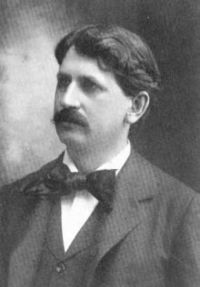
Preacher, educator, pastor, author and humanitarian. First president of the Armour Institute of Technology (now the Illinois Institute of Technology). Read more about Gunsaulus here.
BOOK IV. FROM THE BIRTH OF MOSES TO THE BEGINNINGS OF FREEDOM.
BY REV. FRANK W. GUNSAULUS, D.D.
Egypt the cradle of the Hebrew nation, 161. Bond
age of the Israelites, 161. Oppressors feared the oppressed, 161. Review of Egypt's wealth and proud commercial position, 162. Its enormous achievements
in architecture and constructive art, 162. Egypt the
college of nations, 162. Her government and religion,
163. Pharaoh's inhuman decree, 163. Moses, 164. Parentage of the lawgiver, 164. The mother's stratagem,
164. The ark of bulrushes, 164. Discovered by Pharaoh's daughter, 164. The mother becomes the nurse,
164. Moses is educated in the highest wisdom of the
Egyptians, 164. The murder of an Egyptian taskmaster. 166. He flees to Sinai, 166. Sojourn in Midian, 166.
His marriage, 166 The burning bush and its significance, 167. Moses realizes his mission, 167. Sent by
God into Egypt, 169. The token of the I AM, 170. The
miracle of the shepherd's staff, 171. Moses makes appeal to Pharaoh, 172. Pharaoh's heart is hardened, 172.
The tasks of the Israelites increased, 173. Moses and
Aaron confront Pharaoh, 173. The triumph of Aaron's
rod, 174. The Nile turned to blood, 174. The plagues
are brought upon Pharaoh, 174. Moses demands the
victory for God and refuses compromise, 174. The slaying of the firstborn, 175. The p'oud Egyptian at last
acknowledges Jehovah, 176. The Exodus begun, 176.
God's purpose in the sojourn in the wilderness, 176.
The pillar of cloud by day and of flame by night to lead
the way, 176. Murmurs against Moses, 178. The pursuit of the Egyptians, 178. The Red Sea divided and
Israel's host pass safely through, 180. Swallowing up
of Pharaoh's host, 180. The greatest tragedy of antiquity, 180. The song of triumph of the Israelites, 182.
A Mosaic epic equal to Homer or Milton, 182. The Ode,
182. In the wilderness of Shur, 182. The Israelites
again complain, 183. First of the footsteps of forty
years' travail, 183. Purification of the bitter pool, 184.
The lesson of the early trials of the wilderness, 184.
The affliction of hunger, 184. Lament the fleshpots of
Egypt, 184. Jehovah's promise to Moses, 184. The
flight of quails and the falling of manna, 185. The
smiting of the rock, 186. Israelites' first battlefield, 187.
Joshua's first service, 187. Rout of the Amalekites, 187.
Jehovah's new name, " The Banner," 187. The visit of
Jethro, 187. The division of the people under rulers of
tens, of fifties, and of hundreds, 187. Dean Stanley's
identification of the mount of the law, 188. Israel called
to be a "holy nation," 188. Descent of the Lord upon
Mount Sinai, 190. The " Voice of Jehovah," 190. Moses
receives the Ten Commandments, 190. The foundation
both of worship and of law, 191. Analysis and significance of the Ten Words, 191, 192. The covenant to obey
the laws. 193. Glory of God revealed to the seventy
tribal representatives, 193. Moses' forty days' communion with God, 193. The sin of worship of the golden
calf, 193. Punishment and repentance, 194. Goodness
of God revealed to Moses, 190. The tabernacle, 195.
Aaron's sons consumed by fire from the altar, 195. The
blasphemer punished, 195. The first census of the
Israelites, 196. The Wilderness of Paran, 196. Miriam
stricken with leprosy, 197. Preparation for Canaan, 197.
Caleb and Joshua sent out to spy out the land, 197.
Fear and revolt of the Israelites, 198. Jehovah relents
at Moses' intercession, but decrees that no man of age
save Caleb and Joshua be permitted to enter the promised land, 198. Rebellion of Korah, the Levite, 199.
Terrible vengeance of the Lord, 199. The budding of
Aaron's rod, 199. The death of Aaron, 200. Pursued by
the Edomites, 200. Attacked by the Canaanites, 200.
Lifting up of the brazen serpent, 200. Defeat of the
Amorites, 200. The episode of Balak and Balaam, 202.
The sin of incontinence and its dreadful punishment,
202. Moses sees the end approaching, 203. Appoints
Joshua his successor, 203. Ascent of Pisgah and view
of the promised land, 203. Moses dies "by the kiss of
the Lord," and vanishes forever, 203. Summary analysis
of his achievements, character, and greatness, 204.

English jurist. Read about Hale here.
Lawyer. Learn more about Hoffman here
"The purity and sublimity of the morals of the Bible have at no time been questioned; it is the foundation of the common law of every christian nation. The christian religion is a part of the law of the land, and, as such, should certainly receive no inconsiderable portion of the lawyer's attention. In vain do we look among the writings of the ancient philosophers for a system of moral law comparable with that of the Old and New Testament. How meagre and lifeless are even the 'Ethics' of Aristotle, the 'Morals' of Seneca, the 'Memorabilia' of Xenophon, or the 'Offices' of Cicero, compared with it. 'From the Bible,' says Soame Jenyns, 'may be collected a system of Ethics, in which every moral precept founded on reason, is carried to a higher degree of purity and perfection than in any other of the wisest philosophers of preceding ages. Every moral precept founded on false principles, is totally omitted, and many new precepts added, particularly corresponding with the new object of this religion.'
"So also, Mr. Locke remarks, that in morality there have been books enough written, both by ancient and modern philosophers, but that the morality of the Gospel so exceeds them all, that to give a man a complete knowledge of genuine morals, he would send him no other book but the Testament. These opinions are zealously corroborated by Sir William Jones, who thus expresses himself. 'I have carefully and regularly perused these Holy Scriptures, and am of opinion that the volume, independently of its divine origin, contains more sublimity, purer morality, more important history, and finer strains of eloquence, than can be collected from any other book, in whatever language it may have been written."' On another occasion he repeats, but with a slight variation, the same opinion. 'I cannot refrain from adding,' says he, 'that the collection of tracts, which we call from their excellence the Scriptures, contain, independently of a divine origin, more true sublimity, more exquisite beauty, purer morality, more important history, and finer strains both of poetry and eloquence, than could be collected within the same compass, from all the other books that were ever composed in any age or in any idiom.' 'The two parts of which the Scriptures consists,' continues this distinguished writer, 'are connected by a chain of compositions, which bear no resemblance in form or style to any that can be produced from the stores of Grecian, Indian, Persian, or even Arabian learning. The antiquity of those compositions no man doubts, and the unrestrained application of them to events long subsequent to their publication, is a solid ground of belief that they are genuine compositions, and consequently inspired.'
"If treatises on morals should be the first which are placed in the hands of the student, and the structure of his legal education should be raised on the broad and solid foundation of ethics, what book so proper to be thoroughly studied with this view, if no other, as the Bible?"

President, Tekton Apologetics Ministries. Read more about Holding here.
Independent minister and tutor.
British orientalist and jurist. Read more about Jones here and here.

U.S. broadcast journalist. Read more about Koppel here.
Clergyman. Read more about Langdon here.
There is a remarkable paragraph in the sacred writings, which may be very well accommodated to my present purpose, and merits particular attention. You have it in
As to every thing excellent in their constitution of government, except what was peculiar to them as a nation separated to God from the rest of mankind, the Israelites may be considered as a pattern to the world in all ages; and from them we may learn what will exalt our character, and what will depress and bring us to ruin.
Let us therefore look over their constitution and laws, enquire into their practice, and observe how their prosperity and fame depended on their strict observance of the divine commands both as to their government and religion.
They had both a civil and military establishment under divine direction, and a complete body of judicial laws drawn up and delivered to them by Moses in God's name. They had also a form of religious worship, by the same authority, minutely prescribed, designed to preserve among them the knowledge of the great Creator of the Universe, and teach them to love and serve him; while idolatry prevailed through the rest of the world: and this religion contained not only a public ritual, but a perfect, though very concise, system of morals, comprehended in ten commands, which require the perfection of godliness, benevolence, and rectitude of conduct.
When first the Israelites came out from the bondage of Egypt, they were a multitude without any other order than what had been kept up, very feebly, under the ancient patriarchal authority. They were suddenly collected into a body under the conduct of Moses, without any proper national or military regulation. Yet in the short space of about three months after they had passed the red sea, they were reduced into such civil and military order, blended together, by the advice of Jethro, as was well adapted to their circumstances in the wilderness while destitute of property. Able men were chosen out of all their tribes, and made captains and rulers of thousands, hundreds, fifties and tens: and these commanded them as military officers, and acted as judges in matters of common controversy.
But the great thing wanting was a permanent constitution, which might keep the people peaceable and obedient while in the desert, and after they had gained possession of the promised land. Therefore, upon the complaint of Moses that the burden of government was too heavy for him, God commanded him to bring seventy men, chosen from among the elders and officers, and present them at the tabernacle; and there he endued them with the same spirit which was in Moses, that they might bear the burden with him. Thus a Senate was evidently constituted, as necessary for the future government of the nation, under a chief commander. And as to the choice of this Senate, doubtless the people were consulted, who appear to have had a voice in all public affairs from time to time, the whole congregation being called together on all important occasions: the government therefore was a proper republic.
And beside this general establishment, every tribe had elders and a prince according to the patriarchal order, with which Moses did not interfere; and these had an acknowledged right to meet and consult together, and with the consent of the congregation do whatever was necessary to preserve good order, and promote the common interest of the tribe. So that the government of each tribe was very similar to the general government. There was a President and Senate at the head of each, and the people assembled and gave their voice in all great matters: for in those ages the people in all republics were entirely unacquainted with the way of appointing delegates to act for them, which is a very excellent modern improvement in the management of republics.
Moreover, to compleat the establishment of civil government, courts were to be appointed in every walled city, after their settlement in Canaan, and elders most distinguished for wisdom and integrity were to be made judges, ready always to sit and decide the common controversies within their respective jurisdictions. The people had a right likewise to appoint such other officers as they might think necessary for the more effectual execution of justice, according to that order given in DEUT. 16. 18, 19. --- "Judges and officers shalt thou make thee in all thy gates which the Lord thy God giveth thee throughout thy tribes; and they shall judge the people with just judgment: thou shalt not wrest judgment; thou shalt not respect persons, neither take a gift; for a gift doth blind the eyes of the wise, and pervert the words of the righteous." --- But from these courts an appeal was allowed in weighty causes to higher courts appointed over the whole tribe, and in very great and difficult cases to the supreme authority of the general Senate and chief magistrate.
A government, thus settled on republican principles, required laws; without which it must have degenerated immediately into aristocracy, or absolute monarchy. But God did not leave a people wholly unskilled in legislation, to make laws for themselves: he took this important matter wholly into his own hands, and beside the moral laws of the two tables, which directed their conduct as individuals, gave them by Moses a complete code of judicial laws. They were not numerous indeed, but concise and plain, and easily applicable to almost every controversy which might arise between man and man, and every criminal case which might require the judgment of the court. Of these some were peculiarly adapted to their national form, as divided into tribes and families always to be kept distinct; others were especially suited to the peculiar nature of the government as a theocracy, God himself being eminently their king, and manifesting himself among them in a visible manner, by the cloud of glory in the tabernacle and temple. This was the reason why blasphemy, and all obstinate disobedience to his laws, were considered as high treason, and punished with death; especially idolatry, as being a crime against the fundamental principles of the constitution. But far the greater part of the judicial laws were founded on the plain immutable principles of reason, justice, and social virtue; such as are always necessary for civil society. Life and property were well guarded, and punishments were equitably adapted to the nature of every crime: in particular, murder stands foremost among capital crimes, and is defined with such precision, and so clearly distinguished from all cases of accidental and undesigned killing, that the innocent were in no danger of punishment, and the guilty could not escape.
... How unexampled was this quick progress of the Israelites, from abject slavery, ignorance, and almost total want of order, to a national establishment perfected in all its parts far beyond all other kingdoms and States! from a mere mob, to a well regulated nation, under a government and laws far superior to what any other nation could boast!
It was a long time after the law of Moses was given before the rest of the world knew any thing of government by law. Where kings reigned their will was a law. Where popular governments were formed, the capricious humour of the multitude ordered every thing just according to present circumstances; or their senators and judges were left to act according to their best discretion. It was six hundred years after Moses before the Spartans, the most famous of the Grecian republics, received a very imperfect, and in some particulars very absurd code of laws from Lycurgus. After this feeble attempt of legislation, three hundred years more elapsed before Solon appeared and gave laws to Athens, though a city long famous for arms, arts, eloquence, and philosophy. And it was about five hundred years from the first founding of the celebrated Roman empire, and nearly three hundred years after Solon, before the first laws of that empire were imported from Greece in twelve tables, by ten ambassadors sent there for that purpose. But even when that empire had attained the summit of glory, and legislation was carried to great perfection, however well adapted to a government so extensive and complicate their laws might be, they were far from being worthy to be compared with the laws of Israel, as to the security of life, liberty, property, and public morals: and as to their religion, which was from the beginning interwoven with the state, instead of receiving any greater perfection from the increase of knowledge, wealth and power, it only became a more abundant congeries of ridiculous and detestable superstitions. Moreover; when the Roman empire was overwhelmed and destroyed by an inundation of barbarous nations, and many kingdoms were erected in Europe out of its ruins by the conquerors, laws were extinct under the feudal system; the will of the barons was a law for their vassals; and but a few centuries have past since kings began to introduce law into their courts of justice. And now, though legislation has been carried to such perfection in Great Britain, that land of knowledge and liberty, yet in a political and judicial view the laws of that kingdom may be charged with many great faults, which ought not to be copied: particularly, the tediousness, voluminous bulk, intricacy, barbarous language, and uncertain operation of many of them as to equity, ought to be avoided by legislators who wish for an easy and speedy course of justice among a free people. And perhaps our own courts might be so reformed as to prevent cases of inconsiderable value, and easy decision, from rising through all the stages of the law. Against these imperfections good provision was made in the law of Moses, and it might be much for our advantage to pay greater attention to that example.
Upon a review of what has been said, must it not appear quite unaccountable, that the Israelites should so speedily attain to such an height of good policy and legislation, beyond all other nations? Are we not constrained to acknowledge an intermediate interposition and direction of heaven? Had the unexperienced multitude been left to themselves to draw up a system of civil and military government for themselves, it would have been entirely beyond their abilities to comprehend so complicated a subject; they must have committed innumerable mistakes, in attempting to introduce and establish it; they would have been in danger of jarring opinions, tumults, and insurrections; and probably before the design could be effected, discouragement and confusion would have forced them to surrender into the hands of despotism. But their God provided every thing necessary for their happiness, and nothing more was left to their own wisdom than to submit to his authority, and adhere strictly to his commands: by this, their reputation among the nations would have been equal to the excellency of their laws.
... That as God in the course of his kind providence hath given you an excellent constitution of government, founded on the most rational, equitable, and liberal principles, by which all that liberty is secured which a people can reasonably claim, and you are impowered to make righteous laws for promoting public order and good morals; and as he has moreover given you by his Son Jesus Christ, who is far superior to Moses, a complete revelation of his will, and a perfect system of true religion, plainly delivered in the sacred writings; it will be your wisdom in the eyes of the nations, and your true interest and happiness, to conform your practice in the strictest manner to the excellent principles of your government, adhere faithfully to the doctrines and commands of the gospel, and practice every public and private virtue. By this you will increase in numbers, wealth, and power, and obtain reputation and dignity among the nations; whereas, the contrary conduct will make you poor, distressed, and contemptible.
* Soon after this Sermon was delivered, the Convention of the State of New Hampshire, met according to adjournment, and on the twenty-first day of June accepted the proposed general Constitution of government. This being the ninth State which has acceded to this form of national Union, it will be carried into effect; and there is no reason to doubt of the speedy accession of all the other States, which are now debating on the important question. May all rejoice in the Lord, who has formed us into a nation, and honour him as our Judge, Lawgiver, and King, who hath saved us, and will save us from all enemies and fears, if we thankfully receive and rightly improve his great mercies.
Cleveland merchant, abolitionist, reformer and publisher.
As all civil governments derive their authority from the will of God, it is evident that His law must be regarded as the sole basis of their power. It is true that human society, in the present age of the world, embraces a variety of artificial relations and peculiarities, which had no existence at the time when the law was given; yet these, for the most part, are mainly compounded of original elements, instituted by God at the creation. In adapting His law to those fixed and permanent relations, which constitute the chief elements of the moral system, it cannot be supposed that He would overlook any of their possible modifications; and hence, we find, on examination, that His law is "exceeding broad," and applicable to the minutest circumstances of human life. Notwithstanding the rapid changes which have marked the world's history, He has never found it necessary, either to modify or repeal a single general principle; nor have any of his laws become obsolete. He is the Author of the Jewish code, and of the Abrahamic institutions, and has repealed and altered them as was best.
The Bible constitutes, in fact, the only perfect charter of civil liberty, and standard of social rights and duties; it is the Magna Charta of the world. No human legislator has ever yet been able to devise a single feature of law, possessing any value, either in the moral or municipal departments, that cannot be directly traced to some one or more of the elementary principles made known to us in the Bible. The municipal code of the Jewish Theocracy, when compared with the legislation of modern nations, must be recognized, at once, as the original fountain from whence we have derived nearly all our notions of judicial policy. It has been the chief business of law-makers, in civilized nations, to select, collate, and modify particular features of that code, so as to make them conform to existing relations and habits of those for whom they are designed to be remodeled.
If the authority of civil governments is derived from the will of God, as constituting a distinct feature of his moral administration for the race -- if the Bible comprises a full outline of the rights and duties of communities, as well as of individuals, and if it be true, as He has declared it to be, that civil governments are "His ministers for good," -- "revengers to execute wrath upon him that doeth evil," -- the conclusion is absolutely irresitible, that they are bound by obligations of the deepest solemnity, to carry out, and enforce, by adequate penalities, the pure and unadulterated law of God concerning the social state, to the full extent of their ability. Yet, as no human government possesses the attribute of omniscience, God has reserved to himself the right of judging the heart; and He has left to the civil magistrate the single duty of influencing or restraining the conduct. Take, as an example, the sin of lewdness. The law of God, looking at the heart as the source and fountain of the evil, prohibits, as well the indulgence of an impure desire, as the gratification of lust; while the civil magistrate is necessarily confined to the prevention, or punishment of impure and injurious action. This is a distinction which results from the incapacity of the civil power; and it runs through the whole catalogue of sin. Man judges from the external appearance; but God knoweth the heart.
Although civil government was never designed to exercise its coercive powers in reference to matters that are purely spiritual; yet, as it is always composed of individuals who are personally accountable to God for all the influences which they exert, and as those influences are greatly increased by the position which they occupy, it is clearly their duty to acknowledge their subordination to the divine appointment, and their obligation to the entire will of Jehovah. "Execute judgment beween a man and his neighbor" -- "Execute judgment in the morning," -- "Be wise; kiss the Son." -- Ps. 2.
No man should ever be ELECTED TO OFFICE, therefore, who is either immoral, -- "Take ye wise men," etc. -- or who does not acknowledge that God is the universal Governor, and that all men are bound, individually, as well as collectively, to obey his will, however manifested, whether in the constitution of things, or by direct revelation. God has said, that when the wicked bare rule, the people mourn. Legislators, in constructing a system of laws for the guidance of the people, and for the direction of the executive and judicial departments, are bound to see that it will not only accord in all its parts with the divine economy, but that it will operate efficiently, so far as is practicable, to compel obedience to the entire will of Jehovah, on all matters that concern the social stale. "He that ruleth over men must be just, ruling in the fear of God." -- "And they shall rule the people with just judgment." As the will of God can be more perfectly learned from the Bible than any other source, it is equally their duty to see that the people at large enjoy appropriate means of reading the Holy Scriptures, in order that they may accurately understand the measure of their duty, and the nature of their rights. They cannot otherwise discharge the one or protect the other. Religious knowledge is absolutely essential to civil liberty. The intelligently religious, infidelity herself being judge, have proved themselves, in every age of the world, to be the inexorable foes of tyranny, and the most staunch advocates of rational freedom. Nor are the judicial and executive departments exempt from a single responsibility. As the interpreters and executors of law, they are bound to give it that construction which will best accord with the constitution of things, and with the divine requirements of righteousness and truth.
If communities are held responsible by God in their national capacities, for national acts, in the same manner as individuals, it follows, that they are bound, on all suitable occasions, publicly to recognize their dependence and accountability, and gratefully to invoke the continuance of his providential care and protection. They have no right, upon any other principle, to exemption from those terrible means of national chastisement, war, pestilence, and famine.
The conduct of Benjamin Franklin, in the American Congress, in proposing a solemn and public act of devotion and prayer, when that body was afflicted by the distraction of its councils, was not less philosophical and prudent, than it was needful and appropriate. While civil governments are administered upon the principles here indicated, it is obvious that, inasmuch as their acts are commended to the public conscience, they will find little difficulty in securing the respect and confidence of the good, and the fear, if not the obedience, of those who are inclined to be vicious. Such a course of administration will cultivate, in the community, an increasing sense of obligation, and tend to the diminuation of crime.
Pastor of the First Church in West Springfield, Massachusetts. Read more about Lathrop here.
We are informed of only one government, which was framed under the immediate direction of heaven; and this was a republic. Monarchy was permitted, but never was instituted, by divine authority. The Jews had it, because they would have it. God prescribed for them a better government. The form which he prescribed was well adapted to their genius and circumstances; and, in its fundamental principles, was equally suitable for any other people. Among the privileges secured to them by their constitution, there was one, which might be considered as the foundation of all the rest; and is indeed, the basis of all free government---That their Rulers should be chosen by, and from among themselves.
Moses was immediately ordained by God to lead the people of Israel out of Egypt, and to communicate to them the divine ordinances and laws. But he claimed no authority to command them until by exhibiting evidence of his divine commission, he had obtained their consent to follow him. Much less did he claim for his family an hereditary jurisdiction over them. When he found the burden the burden of government too heavy, for him to sustain alone, he laid the case before the people. He never presumed, of his own prerogative, to create officers under him; but he proposed to them, that they should choose proper persons to assist him. He said to them, 'Take wise men and understanding and known among your tribes; and I will make them rulers over you'. They approved and adopted the proposal. They answered, ?The thing which thou hast spoken is good for us to do.? The people were to choose the men, and present them to Moses; and he, as God's minister, was to instruct them in their duty and give them their charge. God foreseeing, that in process of time, they would incline to a kingly government, expressly provides that their king should be one of their brethren. Moses says, ?When that art came into the land, which he Lord thy God giveth thee, and shalt dwell therein, and shalt say, I will have a king over me, like as all the nations, which are about me; Thou shalt, in any wise, set him king over thee, whom the Lord shall choose; One from among thy brethren shalt thou set king over thee; thou mayst not set a stranger over thee, who is not thy brother.? Again he says to the people, ?Judges and officers shalt thou make thee in all thy gates; and they shall judge the people with just judgement.? Joshua was nominated by Moses to be his successor. And tho? this nomination was by the special command of God; yet, before Joshua entered upon his office, he was presented to the whole congregation of Israel that they might acknowledge him; and he received a charge in their fight, that they might be obedient.
(TM): John Leland, an English dissenting (Presbyterian) minister who settled in Dublin, well deserves Hunt's description as 'the indefatigable opponent of the whole generation of the deists.' Near the end of his life he began writing a series of letters to a friend regarding the history of the controversy, and the result was this massive work, the only tolerably complete contemporary survey of the vast literature on both sides.
Read more about Leland here
Jewish historian. Read about Levi here
Lawyer. Read about Lightner here and here.
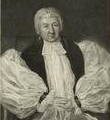
English divine. Read more about Marsh here.
New York clergyman. Educator. Founder of the University of New York. Read about Mathews here and in Appleton's Cyclopaedia of American Biography, Volume 4 by James Grant Wilson and John Fiske.
Professor at Chicago's McCormick Theological Seminary.
Biblical scholar. Read more about Michaelis here.
IT business executive. Founder, Christian Thinktank. Read more about Miller here and here.
English historian and ecclesiastic. Read more about Milman here.

Missionary.
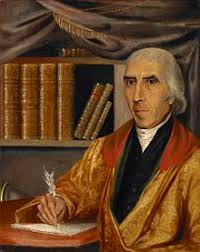
Clergyman. Read more about Morse here and here.
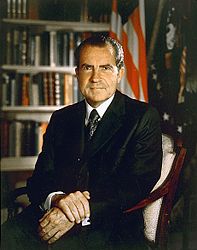
President. Read more about President Nixon here.

Philosopher and scientist. Learn more about Pascal in his entry here, and here
The law by which this people is governed, is in all respects the most ancient in the world, and the only one which has been preserved unaltered in any state. This Philo the Jew has demonstrated on many occasions, and Josephus, most admirably in his discourse against Appion, where he proves it to have been so ancient, that the very name of law was not known in other countries till more than a thousand years after; insomuch that Homer, who has spoken of so many nations, has not once used the word.--p. 108
Irish priest.
American nationally syndicated, conservative radio talk show host. Read about Prager here. Website here. Prager University here.

40th President of the United States. Read more about Reagan here and here.
BY THE PRESIDENT OF THE UNITED STATES OF AMERICA, A PROCLAMATION
Of the many influences that have shaped the United States of America into a distinctive Nation and people, none may be said to be more fundamental and enduring than the Bible.
Deep religious beliefs stemming from the Old and New Testaments of the Bible inspired many of the early settlers of our country, providing them with the strength, character, convictions, and faith necessary to withstand great hardship and danger in this new and rugged land. These shared beliefs helped forge a sense of common purpose among the widely dispersed colonies -- a sense of community which laid the foundation for the spirit of nationhood that was to develop in later decades.
The Bible and its teachings helped form the basis for the Founding Fathers' abiding belief in the inalienable rights of the individual, rights which they found implicit in the Bible's teachings of the inherent worth and dignity of each individual. This same sense of man patterned the convictions of those who framed the English system of law inherited by our own Nation, as well as the ideals set forth in the Declaration of Independence and the Constitution.
For centuries the Bible's emphasis on compassion and love for our neighbor has inspired institutional and governmental expressions of benevolent outreach such as private charity, the establishment of schools and hospitals, and the abolition of slavery.
Many of our greatest national leaders -- among them Presidents Washington, Jackson, Lincoln, and Wilson -- have recognized the influence of the Bible on our country's development. The plainspoken Andrew Jackson referred to the Bible as no less than "the rock on which our Republic rests." Today our beloved America and, indeed, the world, is facing a decade of enormous challenge. As a people we may well be tested as we have seldom, if ever, been tested before. We will need resources of spirit even more than resources of technology, education, and armaments. There could be no more fitting moment than now to reflect with gratitude, humility, and urgency upon the wisdom revealed to us in the writing that Abraham Lincoln called "the best gift God has ever given to man ... But for it we could not know right from wrong."
The Congress of the United States, in recognition of the unique contribution of the Bible in shaping the history and character of this Nation, and so many of its citizens, has by Senate Joint Resolution 165 authorized and requested the President to designate the year 1983 as the "Year of the Bible".
Now, THEREFORE, I, RONALD REAGAN, President of the United States of America, in recognition of the contributions and influence of the Bible on our Republic and our people, do hereby proclaim 1983 the Year of the Bible in the United States. I encourage all citizens, each in his or her own way, to reexamine and rediscover its priceless and timeless message....
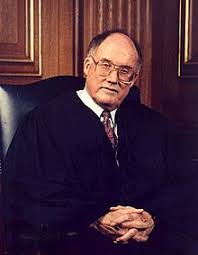
Read more about Rehnquist here and here.
The Court rejects the secular purpose articulated by the State because the Decalogue is "undeniably a sacred text," ante at 41. It is equally undeniable, however, as the elected representatives of Kentucky determined, that the Ten Commandments have had a significant impact on the development of secular legal codes of the Western World. The trial court concluded that evidence submitted substantiated this determination.
American clergyman. Read more about Rogers in Appleton's Cyclopedia of American biography, Volume 5 , edited by James Grant Wilson, John Fiske.
It is an interesting fact, that the first written code of law ever delivered to any people, is found in the Holy Scriptures. The Mosaic code, delivered by the great Legislator of the Universe to His ancient people, is the first published code which the history of the world has recorded; and, it may be remarked, that it is a very perfect system of law.
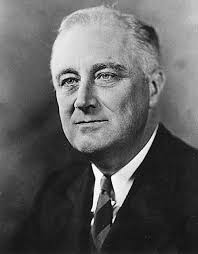
Read more about President Franklin Roosevelt here, here and here.
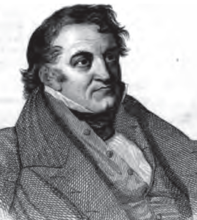
Economist. Historian of France and Italy. Read more about Sismondi here.
"The English are fond of ascribing to this great and excellent monarch [Alfred], either the institution or the confirmation of the laws, privileges, and usages which have tended the most to their prosperity as a nation.
... "Alfred caused a fresh publication of the Saxon laws. This collection contained those of Ina king of Wessex, Offa king of Mercia, Ethelbert king of Kent; to these he added about forty others, framed or sanctioned by himself. Like the Carlovingian kings, he inserted several laws taken from the Judaical ritual into his statutes, as if to give new strength and cogency to the precepts of morality. The Saxon laws, like those of all the people of the North, established the compensation of crimes or offences by pecuniary mulct, according to a regulated scale. The English are also fond of tracing in them the first indications of the glory of their island-trial by jury." Vol. 2, pp. 197-198.
Anglican dean of Gloucester and author.
The Hebrew moral nature is celebrated the world over. Some of the best thoughts on this subject are in Matthew Arnold's recent writings on the peculiar contrasts between the Hellenic mind and the Hebrew mind. He has, I think, joined in the affirmation that no more wonderful moral development ever took place than that which took place in the old Hebrew nation. The moral ideas of the world had their leaven, and largely their model, there. It shows us the force of things invisible and intangible, that the laws, the institutions, and the civil procedure of associated nations to-day, sprang from moral conceptions which dawned in that little pocket of the Orient on the eastern end of the Mediterranean Sea, thousands of years ago. The Hebrews struck so deep, and they struck so utterly the great moral laws of God in their relation to human life, and in their associated action, that in its development the world has more and more built itself upon that which was disclosed by them.

American minister and author. Read the Personal Reminisces of Gardiner Spring in Volume 1 of 2, and Volume 2 of 2.
The Jews were a favoured people. Their penal laws are so much distinguished for discretion, humanity, equity, and mildness, that they cannot but challenge the admiration of every intelligent jurist. Let them be compared with Hales Pleas of the Crown, and it is no difficult matter to see on which side the advantage lies. Nothing escapes their notice. They guard the morals as well as the persons of the community. It were well if every crowded city had as good a system of sanitary regulations as the camp of Israel. The uniform tendency of their whole system of jurisprudence was to promote a good understand ing between man and man; and the great object of their police, the prevention, rather than the punishment of crime. Moses is not less truly the great law giver, than the first historian. The surrounding and contemporaneous nations were far in the rear of this favoured people in every department of legislative knowledge. Chaldea, Egypt, Phoenicia, Media, Persia, then under the sovereignty of Chedorlaomer, had every thing to learn on this subject from the Hebrews. "What nation," says the God of Israel to his chosen people, "what nation is there so great, that hath statutes and judgments so righteous, as all this law which I set before you this day?"
Men do not always follow ancient customs because they are wise. And yet is there no doubt that many succeeding ages, as well as those that were contemporaneous, were deeply indebted to the Mosaic institutions. Dr. Graves, in his admirable lectures on the Pentateuch, says, that "the Mosaic code must have been generally known in those eastern countries from which the most ancient and celebrated legislators and sages derived the model of their laws." Moses indeed labours to impress this thought upon his countrymen as a powerful motive for a careful observance of their institutions. "Keep therefore and do them, for this is your wisdom and your understanding in the sight of the nations which shall hear of all these statutes, and say, Surely this great nation is a wise and under standing people." The lawgivers of nations border ing on the Jews borrowed many of their institutions from the laws of Moses. This was obviously true of the Egyptians and the Phoenicians. During the reign of Artaxerxes Longimanus, while the Jews were scattered throughout the kingdom of Persia, their laws were the subjects of remark and notoriety; for Haman speaks of them to the king as "diverse from the laws of all people." That the extent to which the laws of Greece were indebted to the institutions of Moses was not inconsiderable, may be inferred from the influence of the Hebrew State on the political condition of the world, during the early ages of the Grecian history, as well as from the direct testimony of learned men. Very many points of resemblance between the Grecian laws and customs, and those of the Hebrews are stated by Archbishop Potter, in his Antiquities. The Athenians had a prescribed bill of divorce, and so had the Jews. Among the Jews, the father gave names to the children; and such was the custom among the Greeks. The purgation oath among the Greeks strongly resembles the oath of jealousy among the Hebrews. The harvest and vintage festival among the Greeks; the presentation of the best of their flocks, and the offering of their first fruits to the gods, together with the portion prescribed for the priests, the interdiction against garments of diverse colours, protection from violence to the man who fled to their altars, would seem to indicate that the Greeks had cautiously copied the usages of the Jews. And whence was it that no person was permitted to approach the altar of Diana, who had touched a dead body, or been exposed to other causes of impurity, and that the laws of Athens admitted no man to the priesthood who had any blemish upon his person, unless from the institutions of Moses? And has not the agrarian law of Lycurgus its prototype, though none of its defects, in the agrarian law of the Hebrews? Many of the Athenian laws in relation to the descent of property, and the prohibited degrees of relationship in marriage, seem to have been transcribed by Solon from the laws of Moses. Sir Matthew Hale, in his History of the Common Law of England, affirms, "that among the Grecians, the laws of descent resemble those of the Jews."
It will be universally conceded that the Roman, or Civil Law, as collected and digested by the order of Justinian, has exerted a powerful influence even on the institutions of modern times. Nor is it to be supposed that this intelligent people, who had long suffered under the evils of unwritten laws, when they turned their attention to the formation of a more certain and permanent code, would not consult the existing laws of the wisest nations. Both ancient and modern writers of Roman history, therefore affirm, that the individuals commissioned by the senate and tribunes to form the Twelve Tables, were directed to examine the laws of Athens and the Grecian cities. So that the Roman law must have been not a little indebted to the Mosaic.
Sir Matthew Hale remarks, "that among the many preferences which the laws of England have above others, the two principal ones are, the hereditary transmission of property, and through trial by jury." And who does not see that these originated with the Jews? pp. 71-75.
Extract:
"Where the spirit of the Lord is, there is liberty." The love of liberty thus expressed in the Old Testament is still more clearly indicated by the Christian dispensation. One of the most unfounded objections to Christianity that ever originated with designing, or was believed by foolish men, is that it is adapted to subject the many to the few. So far from this, it is the only religion which honestly and effectually consults the interests of men for time, as well as eternity. It is the only instrument by which the poor can defend their rights and resist the encroachments of the proud and oppressive. The whole spirit and genius of Christianity are everywhere friendly to freedom. It teaches us that men of every tribe, language, clime and colour, are the creatures of God. It announces that the great Creator " hath made of one blood all nations of men to dwell on the face of the earth." It pronounces the incidental, and circumstantial, and temporary distinctions between men, as of minor consequence, and of no account whatever, when compared with the great points of similitude which result from their common origin, their common depravity, their common suffering, common dependence, and common responsibilities.
It is remarked of the divine Founder of the Christian faith, that the "common people heard him gladly." He was himself one of the common people. He was raised from an obscure family in Israel, and was from the humbler walks of life. All his sympathies were with the common people. He knew the heart of the suffering and oppressed, and was touched with the feeling of their infirmities. Of the same character were his Apostles, and the principal teachers of his religion. And of the same character do we find all their doctrines and precepts. " To the poor the gospel is preached." "In Christ Jesus, there is neither Greek nor Jew, barbarian nor Scythian, bond nor free."
We regret to find in a work so truly meritorious, many inaccuracies both historical and typographical. Chedorlaomer, (inaccurately printed Cherdorlaomer) is in one place made to be contemporary with Moses. On p. 48, Sanchoniathan, (inaccurately printed Sanconiathan,) Berosus, Ctesias and Manetho are styled, "the oldest human historians," whereas Ctesias 'was contemporary with Xenophon, and Manetho and Berosus flourished still later, in the time of Alexander the Great. They all, with the exception of Sanchoniathan, if such a person ever existed, which is quite doubtful, lived subsequently to the time of Herodotus the father of profane history, and also of Thucydides. ...
... We allude to these blemishes, not as detracting from the essential merit of the Lectures, but as furnishing a warning to every author to examine well his positions, authorities, and proof-sheets. The type and external execution of the book, aside from these inaccuracies, is altogether attractive.

Biblical scholar. Read more about Stuart here, here and here.
American preacher.
Legal author.
Biblical scholar. Read more about Augustus Tholuck in this biography by Henry Sweetser Burrage, 1879.
SECTION III.
The impotency of the heathen religions to effect any deep and fundamental improvement either of the whole human race, of particular classes of men, or of the powers of the soul in any individual; together with the consequences thence accruing to morality.
THE ROOT OF ALL HUMAN IMPROVEMENT IS RELIGION. The most ancient traces of national cultivation, are connected with temples, the priesthood, and the worship of God. For this reason, we must also consider, and endeavour accurately to apprehend, the development of the mental energies of men, from the principles of their religion. And here we shall at once perceive, that heathenism is by no means adequate to produce a complete expansion and harmony of the human mind.
Extract here: Christianity, on the other hand, if it take deep root in the heart, has power to awaken, in the most ordinary man, a lively interest both in heavenly and earthly things ; because it becomes to him a matter of chief concern, by all the means within his reach, to elucidate, to confirm, and to establish on solid grounds, that which he has experienced in his own soul; and while, in this way, he finds in spiritual things a point of contact with more cultivated minds, he is able to approach nearer to them, and thus share more largely in their improvement. Among real Christians in the lower walks of life, one will easily perceive this influence of conversion in favour of intellectual cultivation; as is seen even in our day, among the lower classes of the United Brethren.
The more sober-minded man will never be able to conceal from himself, that whatever is truth, must be the same not only for the whole man, but also for all men. So that whatever satisfies fully the heart of the common people, must also be sufficient for the claims of the intellectual powers among the more cultivated; and again, whatever manifests itself to the fewer cultivated minds as the highest truth, must be perfectly adequate to the wants of the mass of the people. Now Christianity has broken down this wall of partition. It does not ask, Are you well educated, or not? but, Are you a sinner ? And as every man must answer the question in the affirmative, so it has for all this one reply: "REPENT AND BELIEVE ON THE LORD JESUS CHRIST, AND THOU SHALT BE SAVED."
The cultivated heathen were offended at Christianity precisely for this reason, that the higher classes could no longer have glorious promises for the future; as if they were exalted above all other wise, good, and learned men.
It was most truly an exhibition of the infinite grace of God, that Christ should grant to poor fishermen, country-people, and tent-makers, the privilege of becoming citizens of a heavenly kingdom of joy and bliss, fellow heirs and brethren to the Son of God. But happy is it for the world, that our God is indeed so gracious, that his compassion often appears almost incredible to ourselves!
In like manner, also, it was Christianity, which, by its spirit, abolished slavery in the ancient world. That there should be various modes of civil life, that there should be one class to serve and another to command, is indispensably necessary to every civil community; but liberty ought also to prevail among those who serve. The servant ought to be attached to the master by love and fidelity, and not by compulsion for life.

English Bible commentator.

American President. Read more about President Truman here and here.
TWO AUTHORITATIVE VOICES ESTABLISH THAT THE TEN COMMANDMENTS HISTORICALLY IMPACTED LAW AND JURISPRUDENCE IN AMERICA, NAMELY COLONIAL, REVOLUTIONARY, AND FEDERALIST LAWS AND CONTEMPORARY COURT DECISIONS.
In the case below, the court focused on the religious element of the Ten Commandments, while ignoring the historical significance of the Ten Commandments, stating "[t]he reasonable observer will see one religious code placed alongside eight political or patriotic documents, and will understand that the counties promote that one religious code as being on a par with our nation?s most cherished secular symbols and documents." ACLU of Kentucky v. McCreary Co. 145 F. Supp. 2d 845, 851 (E.D. Ky. 2001). However, there is nothing incompatible nor?more importantly?unconstitutional about a religious document having real, valid, and enormous historical significance, also.
This brief will concentrate on this one aspect of the opinion below, in order to explain why the historical significance of the Ten Commandments helps render their display constitutional. The brief will explain how one of the each of the Ten Commandments has historically impacted American law and jurisprudence and thus, why the Ten Commandments should be permitted to be displayed with other political and patriotic documents.
For the purpose of this amicus brief, the commandments of the Ten Commandments as listed in the Bible Exodus 20:3-17 and Deuteronomy 5:7-21 (and in a shortened version in Exodus 34:14-28) will be summarized as:
1. Have no other gods.
2. Have no idols.
3. Honor God's name.
4. Honor the Sabbath day.
5. Honor your parents.
6. Do not murder.
7. Do not commit adultery.
8. Do not steal.
9. Do not perjure yourself.
10. Do not covet.
Every one of the Ten Commandments was enacted into the laws of the colonies and molded the common law of the colonies.
Bible commentator, archaeologist, scholar, and theologian.
The First Amendment was never intended to insulate our public institutions from any mention of God, the Bible or religion. When such insulation occurs, another religion, such as secular humanism, is effectively established.
In 1961, the Court recognized the fact that secular humanism is a religion, as much so as Buddhism or Taoism. Torcaso v. Watkins, 367 U.S. 488, 495 n. 11, 81 S.Ct. 1680, 1684 n. 11, 6 L.Ed.2d 982 (1961). Subsequently, in Schempp, the Court in reply to an argument made by Justice Stewart in his well-reasoned dissent, stated:
[568 F.Supp. 1426]
Still, the Supreme Court has recognized the importance of the Bible independent of its religious significance and the influence that this book has had on Western civilization cannot be gainsaid. Schempp, 374 U.S. at 225, 300, 83 S.Ct. at 1573, 1612. "To ignore the role of the Bible ... is to ignore a keystone in an arch." Wiley v. Franklin, 468 F.Supp. 133, 150 (E.D.Tenn.1979). A few examples will illustrate this point.
In art, one cannot truly appreciate such great works as da Vinci's Last Supper, Michelangelo's work in the Sistine Chapel, or Albrecht Dürer's woodcuts without some basic understanding of what the Bible contains. Without some introduction to the Book of Isaiah, Handel's Messiah loses much of its force and importance. Literature is replete with biblical allusion. Some of the better known works which rely heavily on allusions from the Bible include Milton's Paradise Lost; the plays of Shakespeare, especially Measure for Measure; Blake's Marriage of Heaven and Hell; Melville's Moby Dick; Faulkner's Absalom, Absalom; T.S. Eliot's, The Wasteland; and C.S. Lewis's, The Screwtape Letters.
[568 F.Supp. 1428]
Our language and popular culture are also replete with biblical allusions. The symbol of the American Medical Association, a staff with a serpent on it, is drawn from an episode in the Book of Numbers, when Moses, at God's suggestion, raised a bronze serpent on a staff and all the children of Israel who looked upon it were healed of snakebites. The phrase "handwriting on the wall" comes from a passage in the Book of Daniel in which handwriting on the wall foretold rough times ahead for Babylonian King Belshazzar. The popular phrase "the apple of my eye" is used in the Old Testament as one of God's descriptions for His people Israel. And, of course, the term "Armageddon" is the site where the battle will take place which will mark the end of the age, as described in the Book of Revelations.
Anglo-American law as we know it today is also heavily indebted to principles and concepts found in the Bible. William Blackstone, one of the most influential figures in the development of the common law, explained:
W. Blackstone, Commentaries on the Law of England, Chitty ed., p. 28 (1866) (quoted in Whitehead & Conlan, supra, at 26).
Further, biblical influences pervade many specific areas of the law. The "good Samaritan" laws use a phrase lifted directly out of one of Jesus' parables. The concept of the "fertile octogenarian", applicable to the law of wills and trusts, is in large part derived from the Book of Genesis where we are told that Sarah, the wife of the patriarch Abraham, gave birth to Isaac when she was "past age". In addition, the Ten Commandments have had immeasurable effect on Anglo-American legal development. Moreover, we as Americans, should especially be aware of the influence that the Bible and its principles have had on the founding and development of our nation. In this regard, it is significant that President Ronald Reagan, on February 3, 1983, issued a proclamation declaring 1983 the "Year of the Bible" in recognition of the Bible's fundamental and enduring influence on our country.
[568 F.Supp. 1429]
Secular education imposes immediate demands that the student have a good knowledge of the Bible. Two defense exhibits vividly illustrate this point. Defendants' Exhibit 14 is a summary of references to the Bible in the 1980 edition of the Scholastic Aptitude Manual, used by high school students to prepare for the Scholastic Aptitude Test (SAT), the results of which are used by most colleges and universities in the admissions process. Defendants' Exhibit 15, a summary of Bible references found in textbooks used in the Bristol public schools, is based on selected books from elementary, junior high and high school classes. Both exhibits bear witness to the overriding importance of providing our children with a basic education in the Bible. In light of the above, it becomes obvious that a basic background in the Bible is essential to fully appreciate and understand both Western culture and current events. Courts must be careful not to so encumber our educators with restrictions as to what can be taught that we prevent them from providing our children with the basic learning experience they need. The Supreme Court has stated that for a course of Bible instruction to pass constitutional muster, it must be taught objectively. Schempp, supra. Clearly, however, absolute objectivity is not possible nor required, for as the Court stated in Lemon, "[o]ur prior holdings do not call for total separation between church and state; total separation is not possible in an absolute sense." 403 U.S. at 614, 91 S.Ct. at 2112.
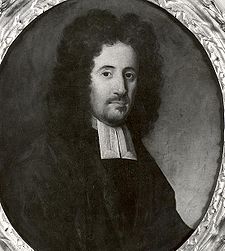
American cleryman and author. President of Harvard College. Read about Wadsworth here and here.

Bishop of Gloucester. Read more about Warburton here.
American lawyer and legal historian, is best known for his three-volume study, The Supreme Court in U.S. History, which won the Pulitzer Prize in 1923. Read about Warren here. The Charles Warren Center for Studies in American History.
... In the meantime, the magistrates were ordered to hear and determine causes according to law; but where there was no law, "then as near the Law of God as they can."1 It was natural and characteristic of the times, that this matter of framing a code should have been entrusted by/the magistrates to two clergymen, each of whom framed a separate model. Rev. John Cotton, a Fellow of Emmanuel College, Cambridge, England, prepared a code called by Governor Winthrop "A copy of Moses, his judicials, compiled in an exact method."2 It was founded on the Scripture throughout, with references thereto, and established a pure theocracy.
"1. No man's life shall be taken away, no man's honour or good name shall be stayned, no man's person shall be arrested, restrayned, banished, dismembered, nor any wayes punished, no man shall be deprived of his wife or children, no man's goods or estates shall be taken away from him nor any way indamaged under colour of law or Countenance of Authority, unless it be by virtue or equitie of some expresse law of the Country warranting the same stablished by a generall court and sufficiently published, or in case of the defect of a law in any particular case by the word of God. And in Capitall cases, or in cases concerning dismembering or banishment, according to that word to be judged by the Generall Court."
2 No copy of this was discovered until 1843, when Mr. Francis C. Gray found it in the Boston Athenaeum. See Mass. Hist. Soc Coll., Vol VIII (3d Series), p. 196.
See also Colonial Laws of Massachusetts, by W. H. Whitmore (1890).
3 In 1641 there was published in London An Abstract of the Lawes of New England As they are now Established, which is probably Cotton's Code. See Mass. Hist. Soc Proc (2d Series), Vol. XVI (1902).
This Body of Liberties was probably not printed in full or published at the time; but in 1649 a revision of all the laws then in existence was published, known as the Laws and Liberties, and a similar revision was made in 1660 (the earliest of which any copy is extant), and another revision was made in 1672.1
"We do not find that by the patent they are expressly directed to proceed according to the word of God: but we understand that by a law or liberty of the country, they may act in cases wherein as yet there is no express law, so that in such acts they proceed according to the word of God."
"The laws of the colony are not diametrically opposed to the laws of England for then they must be contrary to the laws of God on which the common law, so far as it is law, is also founded. Anything that is otherwise established is not law but an error."
Thus as late as 1650, Lord Chief Justice Keble said in 5 How. St. Trials that the law of England was "the very consequence of the very decalogue itself -- as really and truly the law of God as any Scriptural phrase. . . . Whatever was not consonant to the law of God in Scripture . . . was not the law of England but the error of the party which did pronounce it."
So John Milton in his Defence of the People of England in 1651 appealed "to that fundamental maxim in our law by which nothing is to be counted as law that is contrary to the law of God or of reason."
In a book entitled Quaternio or a Fourfold way to a Happy Life, Set forth in a Discourse between a Countryman and a citizen, a divine and a lawyer, wherein the Commodities of the Countrey and the Citie; together with the excellency of Divinitie and the Law are set forth, published in 1636 by Thomas Nash of the Inner Temple, it is said: "Now because it is a hard thing, yea indeede impossible almost, for a man to observe these lawes which he knoweth not; therefore I did desire to know the Lawes of the Kingdome wherein I lived and thereby as a rule to frame and fashion all my actions by ... I had often heard and upon Inquiry I have found it to be true that all Lawes political] are meere derivatives out of the primitive Law of God and Nature."
It seems to be a fact, therefore, that the Common Law . . . was regarded as binding, only so far as it was expressive of the Law of God, or of a particular statute of the Colony. The early court records themselves show the constant citation of scriptural authority. "The reasons of appeal and the answers make much use of quotations from Scripture--a pertinent quotation seemed sometimes decisive in settling a disputed point. Possibly there was sometimes a readier acquiescence in an opinion of Moses than in one of the Lord High Chancellor."1 It is evident that with such a basis for the decisions of the courts, there was little need of lawyers learned in the English Common Law. "When the holy Scriptures were considered as a proper guide in all cases of doubt, and the parties spoke for themselves, there was no place for an order of lawyers."2
1 Early Court Files of Suffolk County, by John Noble, Publications of the Massachusetts Colonial Society, Vol III (1895-1897).
2 Address before the Suffolk Bar on Origin and History of the Legal Profession in Massachusetts, by William Sullivan, in 1825.
--pp. 63-65.
British clergyman.
Presbyterian minister.
British clergyman.
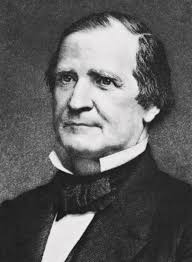
Philanthropist. Read about Wines here.
Pastor of the First Church of Christ in Glassenbury.
Church of England clergyman and religious writer.
Biblical scholar.